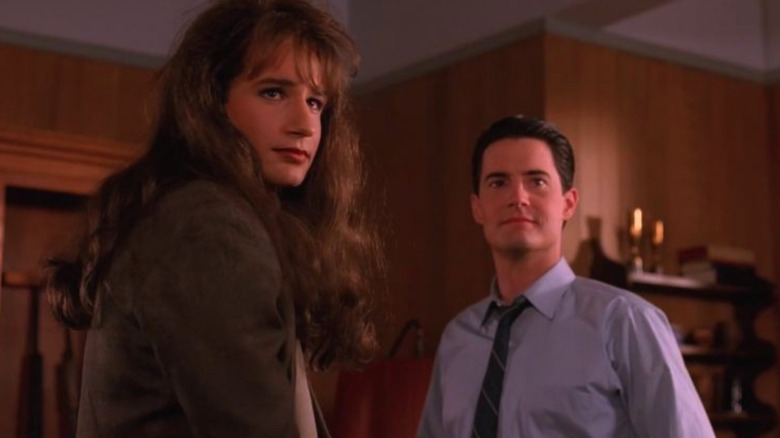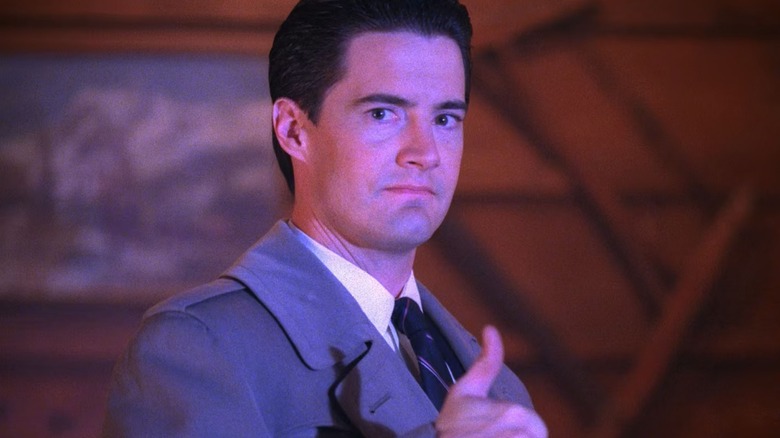
“Twin Peaks” — David Lynch and Mark Frost’s inimitable surrealist-horror series — intrigued and disoriented television audiences when it premiered on ABC in 1990. A heady mix of soap opera parody and dream logic permeates the quaint town of Twin Peaks, whose inhabitants flit between being conscious caricatures and complex, flesh-and-blood characters with vast inner worlds. On its surface, the question of “Who killed Laura Palmer?” haunts the delightfully peculiar episodes of its first season, but the show’s procedural garb slowly sheds itself to reveal something unspeakably frightening. And of course, there’s the Lynchian aspect of it all, where the show’s surreal mythology hones in on spiritual and psychological malaise to examine the root of evil. Every thread connected to Laura and the town itself is unraveled by Special Agent Dale Cooper (Kyle MacLachlan), whose presence feels fated in this story of cyclical trauma.
In a serendipitous turn of events, the series returned after 25 years with “Twin Peaks: The Return,” but the legacy of the first two seasons had already made an urgent, immediate mark over the decades. Chris Carter’s “The X-Files,” which aired two years after Lynch and Frost’s ABC series, wears the influence of “Twin Peaks” on its sleeve from the get-go. Although FBI agents Fox Mulder (David Duchovny) and Dana Scully (Gillian Anderson) aren’t as eccentric as Cooper, their methods are unconventional when they tackle fringe cases with a touch of the paranormal. Moreover, the Mulder-Scully duo often end up embroiled in small-town conspiracies that expose the dark underbelly of such idyllic spaces and often follow hunches that are more surreal than pragmatic.
Some thematic and aesthetic overlaps aside, “Twin Peaks” and “The X-Files” don’t seem to have much in common. Right …? Well, except, the comic book series “The X-Files: Year Zero” situates both shows in the same universe by establishing a direct link between them. What is this connection, and can it be considered canon?
The link between Twin Peaks and The X-Files is Agent Dale Cooper
Mythology is the beating heart of “The X-Files,” filtered through the lens of the supernatural and the inexplicable, and in some cases, the mundane. Karl Kesel, Greg Scott, and Vic Malhotra’s comic book series, “X-Files: Year Zero” taps into these mythopoeia-driven arcs that are more eccentric or playful than its series counterpart. What’s more, Kesel’s comic series opens with a cross-generational story that is meant to echo Mulder and Scully’s partnership, allowing us to draw parallels between X-Files cases of the late 1940s and the post-1993 timeline. “Year Zero” does plenty of narrative re-inventing instead of relying solely on the series we know and love, which sets it apart from traditional tie-ins that usually expand upon an existing story in a linear fashion.
In one issue of “Year Zero,” Mulder and Scully are seen at a diner, where Mulder declines a coffee refill while quipping that it is “a damn fine cup of coffee, as a friend of mine in the Pacific Northwest would say.” This is a direct reference to Agent Dale Cooper — a lover of black coffee and cherry pie — saying this after he orders a cup of joe at the Great Northern Hotel after arriving in Twin Peaks. Moreover, the comic seems to be insinuating that Mulder and Cooper are friends, which isn’t that farfetched if we consider they were both young FBI agents at the time. Although Cooper exclusively tackles small-town criminal cases and disappearances, both he and Mulder have a knack for the unconventional and an appreciation for ideas that might not be considered mainstream.
“Year Zero” is technically canon, as it is a licensed comic book tie-in meant to deepen our understanding of the wonderfully strange world of “The X-Files.” It is also interesting that David Duchovny played Denise Bryson both in “Twin Peaks” and its revival, strengthening the ties between both shows implicitly. In the end, it is a comfort to believe that Dale Cooper knows Fox Mulder and that the two FBI agents must have bonded over their mutual interests and a “damn fine” cup of coffee at some point in the shared universe of their respective worlds.



Leave a Reply